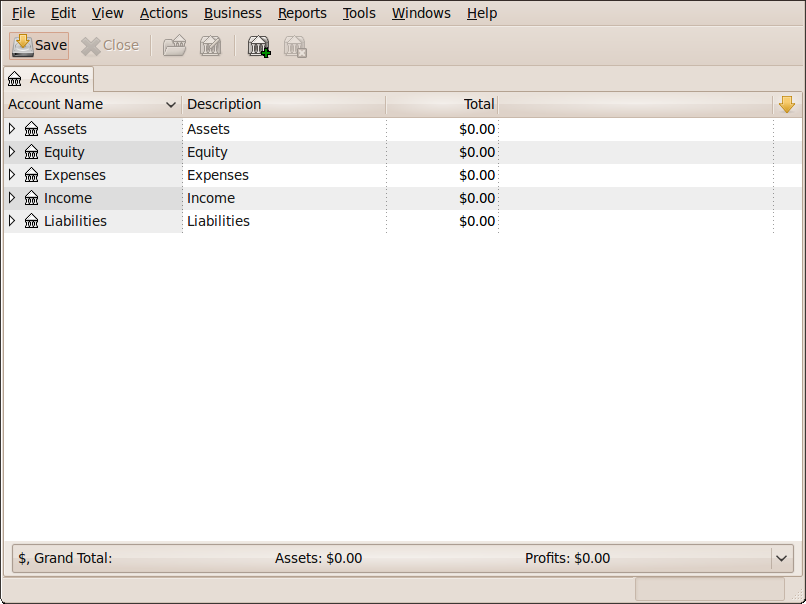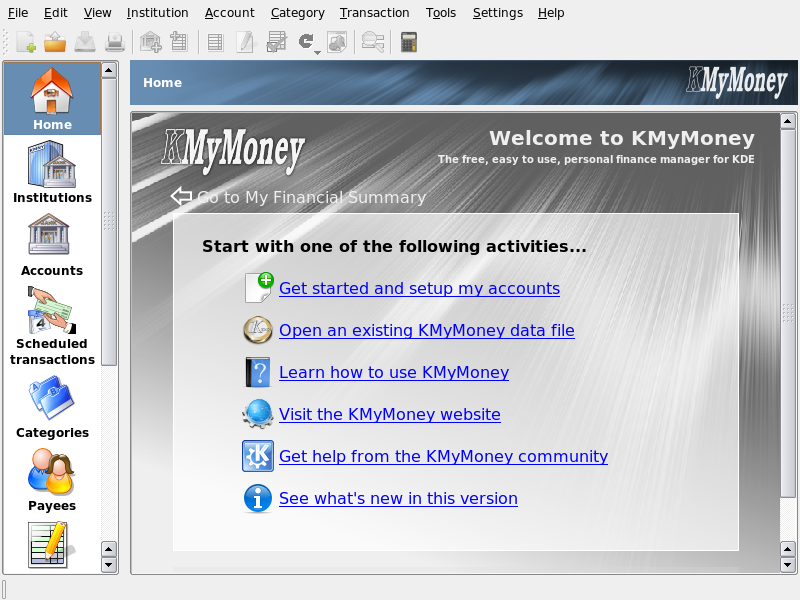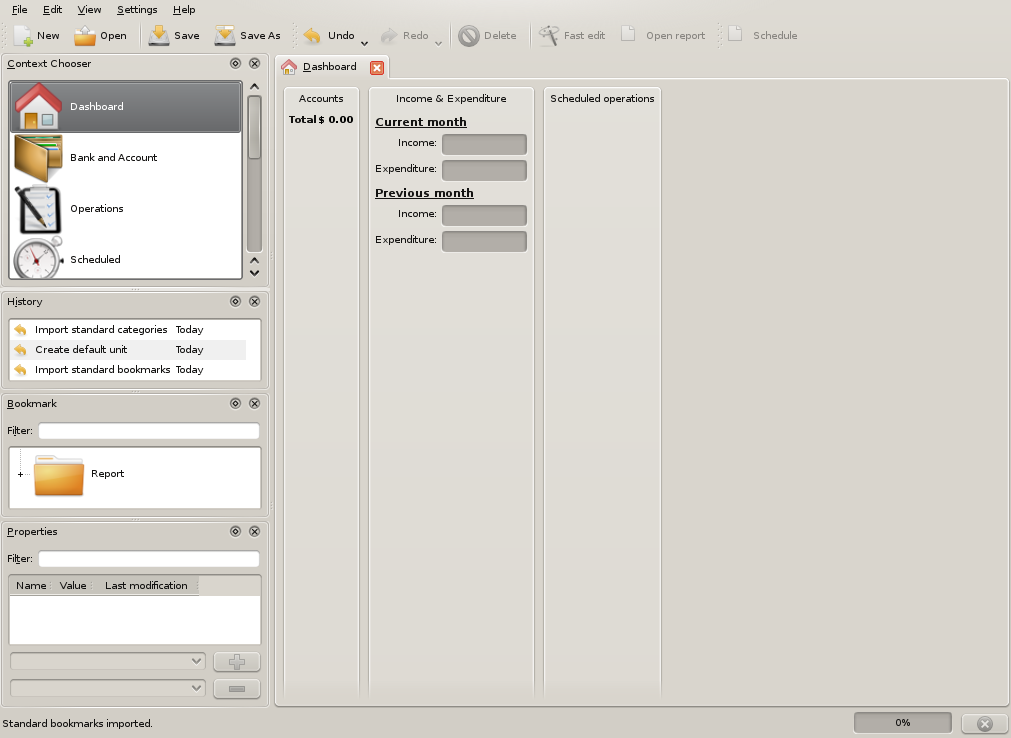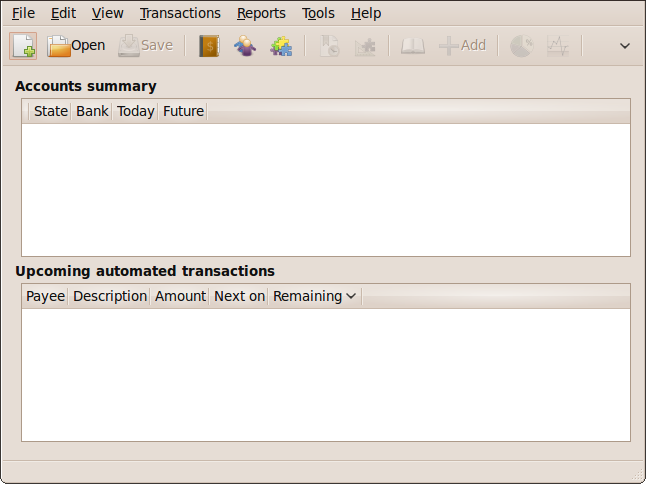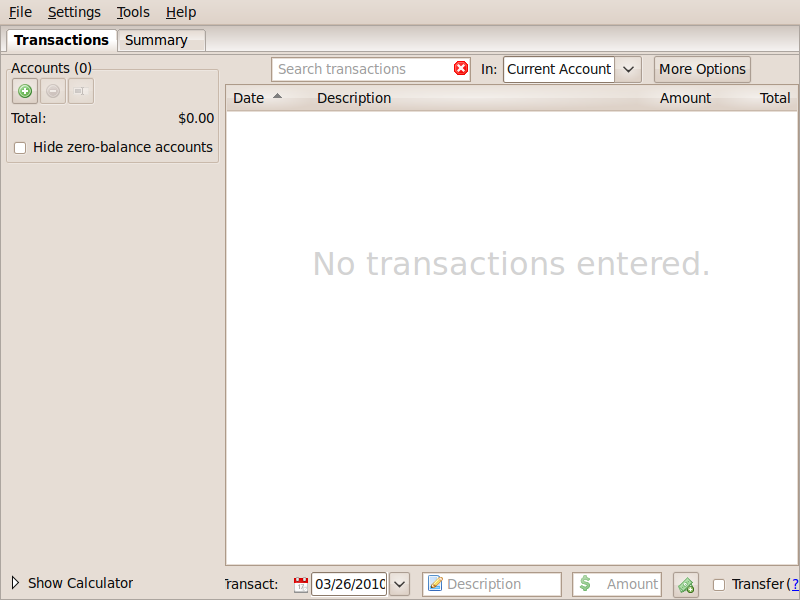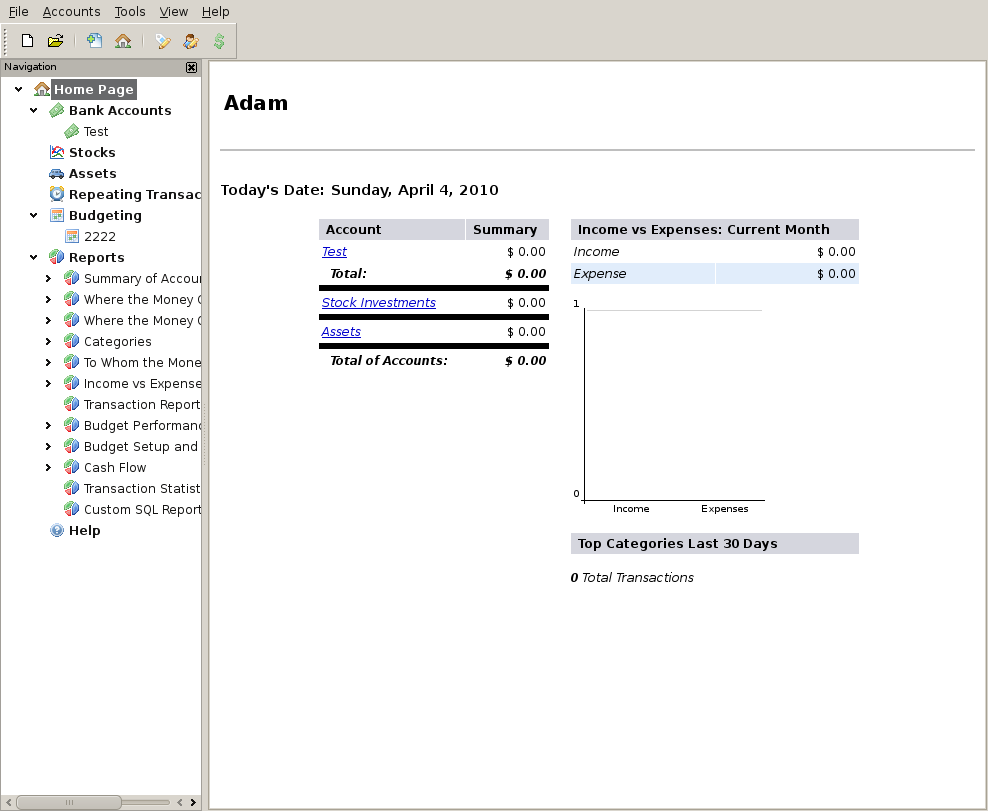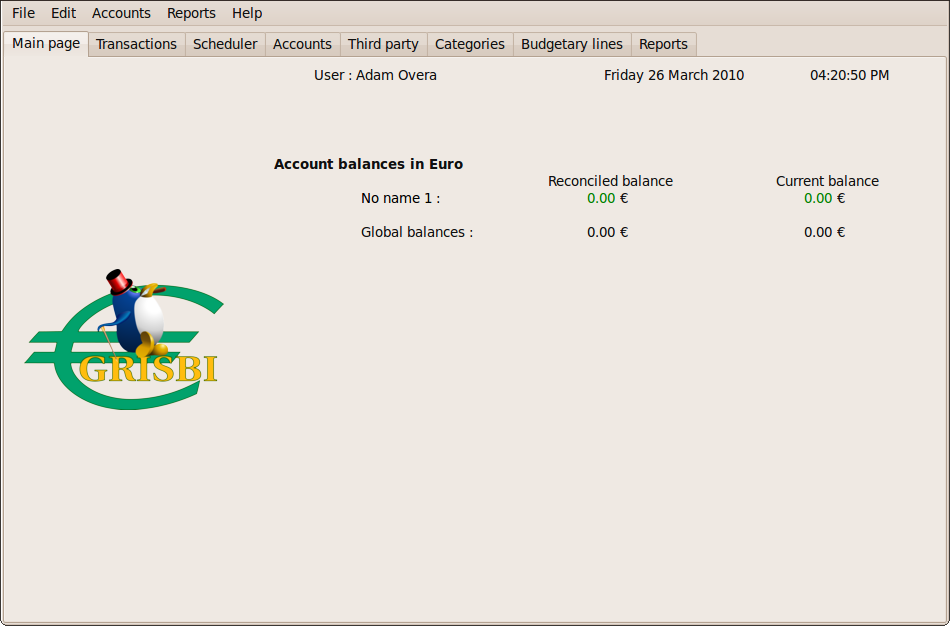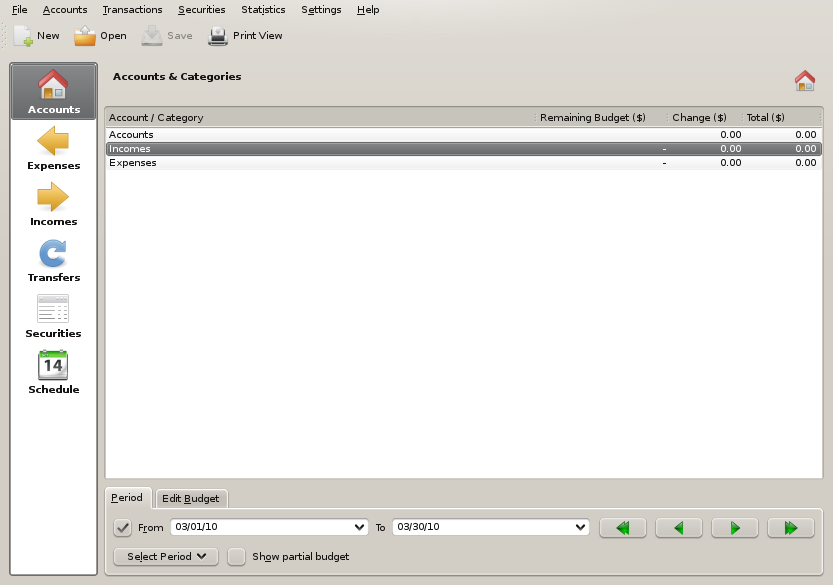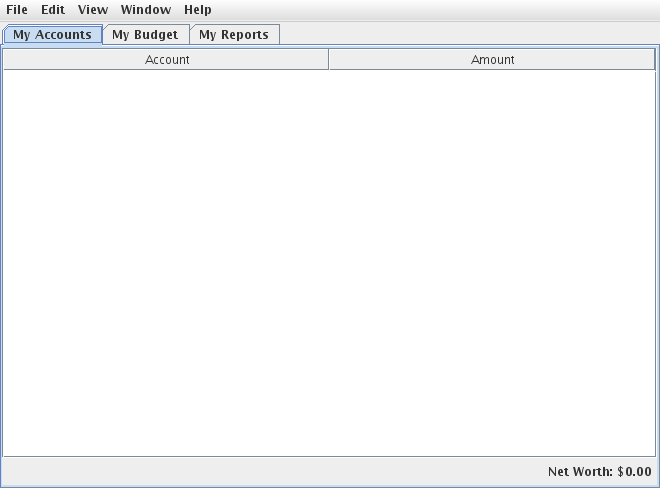Tom's Definitive Linux Software Roundup: Office Applications
Having covered Linux installation, running Windows XP in Ubuntu, Internet applications, and a handful of open source communications titles, Adam Overa is back with a comprehensive look at office apps for Windows users considering a switch to Linux.
Financial Software
Searching for software to handle your finances probably means looking for a Quicken replacement on the home-front, or a QuickBooks replacement for your business. Unfortunately, there is no easy way to export QuickBooks data to another application. However, all of the following products have QIF (Quicken Interchangeable Format) support built-in. While you cannot import your Quicken data all at once using the QDF files, you can grab each account individually as a QIF.
Accounting Software
GNUCash (v.2.2.9)
GNUCash is the financial application for the Gnome Office Suite. It can be installed via Ubuntu's Software Center (formerly Add/Remove Applications in 9.04 and earlier) and also on several other distributions.
While GNUCash can be used to keep track of your personal finances, it is a bit of overkill. This program truly shines if you are interested in keeping tabs on absolutely everything. This application definitely falls into the QuickBooks replacement category. As its splash screen indicates, GNUCash is "Free Accounting Software." This means you should have a prior knowledge of basic accounting principles before attempting to use it, specifically the ins and outs of double-entry book keeping.
While there is a new user manual, it's pretty large and it goes over basic concepts before even getting to the application, so plan on devoting some time to it if you are new to accounting. And without prior knowledge, or using the manual, the new account setup wizard can be overwhelming. Though GNUCash isn't too user-friendly, this application is fully-featured. If professional bookkeeping is one of your mission critical tasks, GNUCash is definitely worth a closer look. Otherwise give KMyMoney a shot.
Personal Finances
Get Tom's Hardware's best news and in-depth reviews, straight to your inbox.
KMyMoney (v.1.0.2)
Of the different financial apps that we looked at for this roundup, KMyMoney is one that I would personally use. Why? Because it is both simple and comprehensive. Unlike the more robust GNUCash, I don't feel like I need a background in accounting to do my own finances with KMyMoney. And yet, this application still manages to feel professional-grade, also employing the double-entry accounting method.
Perhaps it won't be the go-to app for accountants, but for personal finances, it's very nicely appointed. Simply put, this title has to be the closest thing to Quicken available as a native application for Linux. The home screen is eerily close to that of Intuit's latest offering. KMyMoney also makes good use of wizards to guide the new user through the process of setting up their financial information. Most of the other options on this list approach the learning curve with the always-fun RTFM stance.
skrooge (v.0.2.9)
Skrooge is yet another KDE financial application. This app primarily differs from KMyMoney in scale. Skrooge is a much more lightweight application. Gone are the wizards and double-entry bookkeeping. The good news is that you don't really notice, just as long as don't try to make Skrooge into something more robust.
Instead of appearing anemic, like many of the other lightweight financial apps, Skrooge is perfectly suited to simple or regular financial situations. Another area where Skrooge differentiates itself from its bigger cousin is in native support for KDE 4. Skrooge was written from the ground-up for KDE 4, where KMyMoney still has yet to debut a stable release. Overall, Skrooge is a great app for those with simple financial management needs.
HomeBank (v.4.0.3)
HomeBank is a great app if you like analysis. Being able to see where your money has gone and where it is likely to go in the future is probably the biggest draw that HomeBank features. If you're a fan of charts and graphs, this app is for you.
While HomeBank doesn't have the wizards that I like to see, its documentation is complete and goes step-by-step through the various operations needed to set up your financial records. Scalability is another big plus that HomeBank brings to the table. This application can go from simply keeping track of the standard checking and savings accounts to figuring out how much your car really costs you, while tracking multiple types of accounts.
Some of the more robust apps feel like overkill for simple financial needs, while some of the more lightweight applications just wouldn't be appropriate for more complex environments. In either scenario, HomeBank just feels right for the job. One minor irritation that I encountered with the interface was that it opens a second window for account transaction details. Not a big deal if you have simple finances, but this can become a window management nightmare if you need to make changes to several accounts at once.
The good news is that the HomeBank crew is open to suggestions and frequently implements them. After all, “That's the reason why HomeBank is what it is today.” Hopefully the team sees this article and transitions to a single-window, tabbed UI design at some point in the future.
wxBanker (v.0.5)
wxBanker is definitely a lightweight app, but in a good way. This title doesn't have all of the advanced features that pretty much all the others do. It does handle a few currencies, but it cannot currently sync with online bank accounts. The point of wxBanker, in its developer's own words: “is to keep your own separate balances to compare with your online banks and other accounts, much like when you use your checkbook registry to balance your checking account. Keeping your own balance separate from online interfaces allows you to avoid the pitfalls of exclusively using such interfaces, which can't be aware of charges which haven't gotten to them yet, such as checks you wrote, batched transactions.”
And for what it does, it's great. The app employs two tabs, one for your accounts and transactions, and a second tab for a summary in the form of a chart. This is a perfect tool for someone with very simple finances or anyone who is cash-heavy. So, while it doesn't do what the others do, it doesn't try to, either. I can't help but think how much I would have saved in overdraft fees in college, back in the early days of online banking when the ATM, telephone, and Web site updated at three different intervals.
If you have even moderately-complex accounts, wxBanker isn't going to be the financial title you want to use. But for the average college student or young adult just starting out in the world, it sure beats a check register or those tiny little ledgers they give out with new debit cards.
Money Manager EX (v.0.9.4.2)
Along with KMyMoney, Money Manager EX (MMEX) is the only other financial app that has a wizard to help facilitate the initial setup of your financial information.
This application can track stocks and assets, along with accounts. MMEX is capable of handling several currencies, and you can also set transactions to repeat automatically at specified time intervals. Where MMEX sets itself apart is in its budgeting and reports. You can set financial goals, and there are a ton of ways that MMEX will show you how well (or poor) you size up to them.
The user interface is very dated, but uncluttered. Everything from accounts to reports can be quickly accessed via the left pane, and simultaneously displayed on the right. Since MMEX is tri-platform, and offers a Web-based version as well, it is a great fit for anyone using multiple operating environments.
Grisbi (v.0.5.9)
At first, Grisbi appears to be an empty window with a file menu. Once you open or create a new account, you finally get to see all of the tab-based options that this application offers.
Too bad I had to figure that out myself, though. This is another program that takes the RTFM approach instead of using wizards. Unfortunately, Grisbi's FAQ and documentation are only available in French. While there is a link to an English translation of the current user guide, it's pretty sparse, and the navigation controls remain in French. This is a shame, because Grisbi works with multiple currencies and even keeps track of money spent on taxes, something many others don't touch.
Grisbi also integrates quite nicely with GNOME, which is a big plus, since most of the top-quality financial apps are of the KDE persuasion. If you have the patience for it (or know French), Grisbi is one of the more robust financial apps in terms of its feature set. Just don't expect a user-friendly experience.
Equonomize (v.0.6)
Eqonomize has a funky Web site, but it's a decent application.
I couldn't figure out how securities work, and the handbook doesn't exist, but without them Eqonomize functions really well as a light-weight financial app.
The interface is much like that of our favorite, KMyMoney. A very thin left pane contains icons for accounts, expenses, incomes, securities, and a schedule. The rest of the screen shows the contents of each in detail. I didn't need any assistance to quickly set up a simple cash/checking/income data set. This application did crash a few times on our test machine.
Buddi (v.3.2.2.1.0)
Buddi is another financial app that runs on all three major platforms and has a dated, yet efficient interface. The UI consists of three tabs for accounts, budgets, and reports, plus a menu bar. This app make good use of black and red ink (or font, in this case) to differentiate between positive and negative amounts.
Buddi is fairly configurable. You can create new types of accounts if the presets don't work for you, or create scheduled and/or repeating transactions. The Web site contains how-to information on the app's basic functions, along with an FAQ and a handful of plugins, including a QIF importer and exporter.
-
ksa-_-jed And don't bother looking for any anti-virus becuase you don't need it or cracks for your software becuase almost all app are free !!!!!!!Reply -
DjEaZy ... for my laptop @ work the only licensed thing are win7hp and KAV... all other apps are free... infrerecorder, inkskape, OOo and so on...Reply -
bloody llama Open Office and the other open source software are great for what they are, but try replacing Access 2007 or 2010 with something open source, and you'll be tearing your hair out.Reply -
jsowoc I assume that OO 3.0.1 is what you have in the repositories - was that the reason for testing the older version (version 3.2 came out two months ago)?Reply -
JonathanDeane bloody llamaOpen Office and the other open source software are great for what they are, but try replacing Access 2007 or 2010 with something open source, and you'll be tearing your hair out.Reply
This is very true, I love Open Office and for my home use it does 100% of what I would use MS Office for, that being said if I had to run a business on it I am afraid it would be worth it to pony up the dough for an MS product. -
ejmarkow Tom's Hardware omitted the best performing, most comprehensive, free and Open Source Accounting ERP software available for download. It's called "xTuple ERP PostBooks Edition" and utilizes PostgreSQL. This software is capable of running anything from a small to large business. Link: http://www.xtuple.orgReply -
killerclick We installed Linux and OOo into one of our offices (sort of an experiment to cut costs) and it was a riot. Not that Linux and OOo are bad, it's just that the power of habit is too strong to break when Windows and Linux are concerned. Windows and OS/X... not so much apparently.Reply -
Open Source is the future. ...... companies that profit millions or billions off of proprietary software. They are what hold us back.Reply
-
randomizer killerclickWindows and OS/X... not so much apparently.Well it's not like Office on Windows and Mac are vastly different, I'd hope that users would feel comfortable using the exact same software...Reply
I must attest to the uselessness of OOo Calc though. It needs a ground-up rewrite. It's slow to load and process even a small to moderately sized amount of data and charts are slow to redraw when altered. I have not tested GNUMeric enough to comment on that but it's supposedly alot faster.
I'm interested in looking at those project management programs. There's also OpenProj to add to the list. -
haplo602 hmm ... not my area of software, I try to avoid office apps as much as I can, but last time I worked in Writer/Calc it was slow and unresponsive. The best thing in Writer was the TeX like equation editor, way better than what MS had to offer. I think they made some progress on OOo since that time, so I'd have to test.Reply

